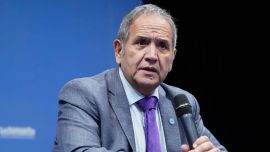The last time Luis Caputo negotiated with the International Monetary Fund, fierce disagreements over how to manage Argentina’s struggling currency caused him to quit his job as the country’s Central Bank chief.
A little more than five years later, Caputo is back for a second act, and the IMF that forced his exit during those 2018 talks is cheering his initial efforts to salvage an economy that plunged further into crisis.
Tapped by libertarian President Javier Milei to lead the economy ministry, Caputo on Wednesday reached a staff-level agreement with the Washington-based lender over how to save a US$44-billion aid programme that the IMF said Wednesday “went severely off track” with the previous government.
The pact is key to unlocking a US$4.7-billion IMF disbursement Argentina needs to repay debts owed to the Fund itself, and will also provide breathing room until the next IMF review in May. By then, Caputo and Milei can decide whether to negotiate a completely new deal or seek more funding. In the near term, Caputo only saw one option.
“What we’ve done was the most viable alternative,” Caputo told reporters at a press conference Wednesday night. “If I would like to go to a new programme and eventually seek new funds, the IMF is open to that possibility. But we honestly believe that it’s time for the country to resolve its financial problems, or as I’ve said, its structural root problems.”
Press offices at the IMF and Economy Ministry didn’t respond to multiple requests for comment, nor written questions. In a statement Wednesday, the IMF praised Caputo’s “strong policy package” but acknowledged “the path to stability will be a challenging one, with conditions worsening before they get better.”
The deal marks a striking turnaround for Caputo and the IMF, one precipitated by Argentina’s continued decline and Milei’s prescription of “shock therapy” to reverse it. His ability to win an agreement with an institution that once drove him out of government, meanwhile, may help bolster market optimism that he may be able to navigate the litany of problems ailing South America’s second-largest economy.
“It’ll be a more politically-savvy Caputo, he has more experience in government,” said Gustavo Flores-Macias, a Cornell University public policy professor. The government and IMF “are more aligned now than they were in 2018, and Milei has the advantage of riding this honeymoon in international financial markets.”
‘I had to go’
The problems between Caputo and the IMF began almost immediately after former president Mauricio Macri appointed him to lead the Central Bank in June 2018 after previously serving as finance chief.
Caputo, a veteran of Wall Street, had opposed Argentina’s initial approach to the lender earlier that year, a position that along with his lack of monetary policy experience caused IMF staff to see his appointment as “another big mistake by Macri,” former negotiator Alejandro Werner wrote in a book published last year.
Werner added that Caputo would call IMF officials with “urgent calls and ‘life and death’ demands” to make it seem a full-blown crisis was imminent — an effort to pressure the IMF into concessions.
The primary source of tension, however, was over how to manage Argentina’s limping currency. Caputo wanted the right to freely intervene in foreign exchange markets to prop up the peso, which at the time operated under a floating exchange rate without any controls. But the IMF baulked at using its money that way.
In September 2018, former IMF managing director Christine Lagarde criticised the Argentine Central Bank’s communications with markets in an interview with the Financial Times. Caputo quit soon after, sensing a clear message had been sent.
“I had to go,” he recounted at an event in 2019, adding that IMF officials had said they couldn’t stand him anymore.
The two sides have since moved closer to the same page.
By April 2019, the IMF had reversed course, allowing Caputo’s successor to intervene as he’d wanted to. It fully eased its approach under former president Alberto Fernández, letting his government maintain an artificially strong exchange rate through various interventions and an ever-growing web of currency controls that swelled into a problem for the economy.
Caputo, by contrast, returned to the government with a mandate to unwind those controls. In December, he announced a series of sharp spending cuts and a 54 percent devaluation of the peso — a move IMF Managing Director Kristalina Georgieva hailed as “an important step toward restoring stability and rebuilding the country’s economic potential” in a social media post.
Still, numerous potential pitfalls remain. It is unclear how fast Caputo and Milei will be able to end the currency controls, or whether the IMF will maintain its lax approach to intervention as the peso faces losses that could revive the debates that caused friction in the past.
For now, Caputo has maintained the crawling peg currency framework he inherited in order to prioritise fiscal austerity. The Central Bank, meanwhile, has also let the peso devalue at two percent per month, a pace investors see as insufficient with prices increasing at far higher rates.
In the face of looming labor strikes and signs that market optimism is beginning to fade, Caputo’s ability to communicate with both investors and the public will be crucial.
“The communication aspect will be fundamental,” Flores-Macias said. “The framing of the negotiations will be very important if this programme is successful or not.”
by Patrick Gillespie, Bloomberg
























Comments